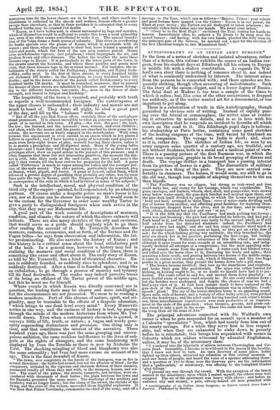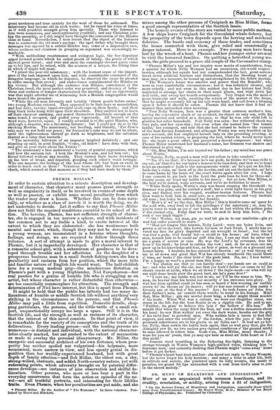AUTOBIOGRAPHY OF AN INDIAN ARMY SURGEON. * IN the form of
a series of sketches and isolated adventures, rather than of a fiction, this volume exhibits the career of an Indian sur- geon, from his student days at Edinburgh till his return to Europe in middle life with a shaken constitution. As regards Dr. Wal- ford's own story there is nothing of romance about it, nor indeed of what is commonly understood by interest. The interest arises
i
from the persons he is connected with ; and those episodes are fre- quently striking, though often savouring of melodramatic. Such is the story of the opium-clipper, and in a lesser degree of Eunice. The fatal duel at Madras is too true a sample of the times to which it refers; but, like some of the other occurrences, is dropped too suddenly, as if the writer wanted art for a denouement, or was impatient to get along.
There is a substratum of truth in this Autobiography, though garnished by obvious arts of writing. Instead of rapidly pass- ing over the trivial or commonplace, the writer aims at render- ing it attractive by minute details, and is so in love with his own description that he suspends an incident to describe all which occurs on the road to it. His Edinburgh pupil days is tedious; his studentship at Paris better, containing some good sketches of the leading surgeons of the time, well varied by Gayleard an artist companion. The voyage to India is short; and, short as it is, rather dry. The sketches of Indian life, as seen by an army surgeon some quarter of a century ago, are truthful, and not without freshness, both in a social and a medical point of view. There is a passing picture of the first Burmese war, in which the writer was employed, graphic in its broad grouping of disease and death. The voyage thither in a transport has a passing interest from its picture of horses in a gale. The discomforts of military passengers is a thing of the past. They are now carried com- fortably in steamers. The horses, it would seem, are still to go in the old way, though less capable of adapting themselves to the sea than bipeds.
" The Fazilbarry was no clipper, but strong as teak-wood and iron could make her, and roomy for her tonnage, which was considerable. The guns, carriages, and limbers, wheels, shot, shell, and gunpowder, were stowed away below water-mark, the gun-deck hatches well secured upon them, and the gun-deck itself divided by uprights, to which the horses were picketed,
head and heel,' arranged in three lines; rows of water-casks dividing each tier of horses from another, and affording great facilities for watering them. The transport dropped down the river, and in due time, and in company with others, dismissed her pilot and was at sea.'
" It is the fifth day that the Fazilbarry had made nothing but leeway ; morn was just breaking ; the gale had overhauled its bellows, and had put a fresh hand to it, and the transport rose lazily to the onward swell, as if still half awake from her disturbed slumbers: indeed, the Fazilbarry had passed a very bad night,' and she and her cargo animate stood much in need of soda-water. There was none at hand, so they 4ot an extra dose of salt; for the wheel-lashing giving way suddenly, the ship broached-to; the next sea struck her in the quarter, purloining the hen-coops, but luckily taking nothing else. Without a recurrence of this the wheel was secured, although it spun round for some seconds at an astonishing rate, and indig- nantly declined all attempts at a compromise ; but the most appalling min- gling of sounds arose from the gun-deck. A water-cask had fetched away, and rolled over the horse close to it, fracturing his limbs and spine ; then acquiring a force eundo, and passing between two horses of the middle range, it came in contact with another cask, which it liberated, and like two huge pestles in a great mortar, they ground the horses down into a pill mass. " The horses became terrified; they tore up the stanchions and ringbolts, and broke their gear like packthreads. The apace was rather limited for kicking, as kicking ought to be, or no doubt we should have had it to per- fection. The casks rolled to and fro, and mowed them down playfully. A more fearful scene of uproar could scarcely be. No one could venture down ; but the hatches were unshipped, and despite the chance of seas we had 'a bird's-eye view of it. It had been instant death to have ventured on the gun-deck of the Fazilbarry, where Pandemonium was in rebellion. Crash ! squash ! parish ! The cry of the terror-stricken horse is an appalling sound. Spare sails, coils of hawser, and a variety of other bulky articles, were pitched down the hatchways; and rebel casks having knocked each other's brains out, these miscellaneous impedinzenta were soon productive of an improve- ment in the state of the gun-deck ; when troopers, grooms, and grass-cut- ters dared to take a part in the scene. These two casks did more damage to the troop than all the arms of Ave." The . principal adventure connected with Dr. Walford's own career is when he gets suspended for an assault upon a member of a Calcutta " speculative " firm, which had nearly done him out of his scanty savings. For a while they serve him to live respect- ably, but when they are exhausted he sinks down to poverty before he is reinstated; this brings him acquainted with scenes in Calcutta which are seldom witnessed by educated Englishmen, unless, it may be, of the missionary class. "I wandered into the labyrinth of streets between Chowringhee and Cir- cular Road. Insensibly, I became so bewildered in the mazes of the locality, that I knew not how to turn. An open doorway of some place, better lighted up than others, attracted my attention at this critical moment. I soon saw heads of people, and heard the voice of a speaker addressing them ; and a question or two to those near the doorway gave me the information that a 'padre-sahib,' or missionary, was offering to the benighted Hindoo 'glad tidings.'
"I pressed my way through the crowd. With the exception of the bench nearest to the missionary, upon which I seated myself, the others were well occupied. The air of the apartment was heavy with odours; and before an audience oily and steamy, a pale, silvery-haired old man preached with • Autobiography of an Indian Army Surgeon; or Leaves turned down from a Journal. Published by Bentley.
great meekness and true anxiety for the weal of those he addressed. The missionary bad become old in such works; but he raised his voice at times, as if with youthful strength given him specially. Those who listened to him were numerous, and unexceptionably youthful; and any Christian join- ing the assembly, as I did, might have thought the conversion of the Hindoo close at band. Nevertheless, I soon learnt that the object of the listeners was to controvert the old man's sayings : the aged father who brought these messages was opposed by a subtile Hindoo boy, come of a disputative race, whose coolness and clearness in grasping an argument was exceedingly re- markable.
" With unblushing countenance and stringent logic, the boy-disputant urged forward points which he called proofs of falsity, the power of which showed great talent ; and ever and anon the cunningly-devised query came up to his lips, and he seized, with the acumen of a lawyer, the fitting time in which it might tell most.
"I pitied the poor old missionary ; with the keenest sense of the import- ance of the task imposed upon him, and with considerable command of the Bengalee language, in which he disputed, he observed the cause he pleaded to suffer among that crowd ; and under-tones complimented the Hindoo on his victory. But although the audience was Hindoo, contemners of the Christian creed, the most perfect order was preserved, and decency of beha- 'dour and coolness of temper characterized the meeting; but an opportunity was that night afforded me of witnessing how a Moslem congregation would have treated the preacher. "While the old man fervently and lavishly 'threw pearls before swine,' two young Moslems entered. They appeared to be link-boys or mussalchies, and had dirty, tawdry, tinsel-wrought skull-caps on their heads ; and their long black locks hung wild upon their shoulders. They omitted not to leave off their cheeroot smoking, and seated themselves familiarly enough on the same bench I occupied, and puffed away vigorously. All hearers of that word were, however, equal. I readily awarded it to the quiet Hindoo, who, although a disputer, was a becoming listener ; but I could not do so to the smoking Moslem. The missionary, not heeding, said blandly, For Zion's sake may we not hold our peace ; for Jerusalem's sake may we not be silent, until the righteousness thereof go forth as brightness, and the salvation thereof as a lamp that burneth.' "The unworthy. followers of an impostor laughed derisively ; and one standing up said, in good English, 'Come, old fellow ! have done with that, and give us your stave about the Trinity !' "The missionary's face underwent a variety of painful expressions, which told how the sarcasm cut. I took the Moslem's arm, and led him out ; his friend followed without any trouble. They turned their backs frowningly on the best of bread, and departed, grasping each other's waist lovingly. Who can measure the feelings of the man whose life had been an exile in order to teach such as these ? Vexatious tears sought the furrows on his cheek, which seemed at that moment as if they had been made by them."



























 Previous page
Previous page